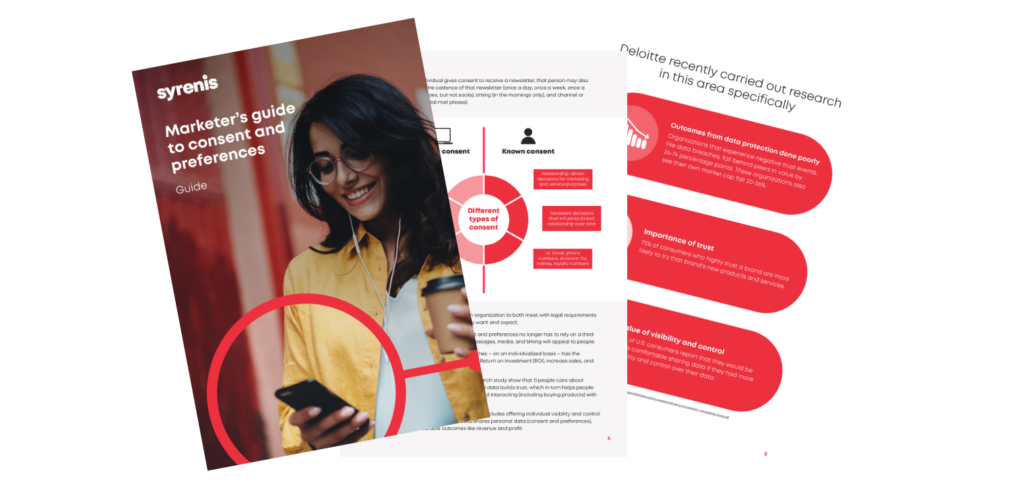Customers care about their privacy.
When targeted advertising crosses the ‘creepy’ line, today’s customers simply walk away from the offending company.
Some of those customers go so far as to take a company to court.
Knowing when a customer is pregnant – even before they have told friends and family – seems to be well over the ‘creepy’ line.
When brands cross the line
More than 10 years ago, consumers called out Target for crossing that line. By understanding purchasing habits of customers on its baby shower registry, Target developed an immensely accurate model that predicted not only which customers were pregnant, but also when they might be due and the sex of the child-to-be.
Target used this information to send targeted coupons in the mail. One of these recipients of pregnancy-focused coupons was a teenaged daughter who had not yet told her father of her pregnancy. Oops.
This case was a well-publicized wake-up call for the advertising industry to be cognizant of customer sensitivities to data collection and use, and a wake-up call to consumers who were not previously aware of the amount of data available about them and how corporations were using it.
The recent case (and win) against Meta
Years later in 2025, targeted marketing and pregnancy profiling has come to the forefront of the privacy conversation – this time with potentially even more serious implications for digital marketing departments.
In this more recent case, a London resident and Facebook user discovered in 2017 that she was pregnant. Before she had even told important people in her life, Facebook was serving up targeted ads focused on “babies and pregnancy and motherhood.”
She filed a suit in 2022 against Meta, demanding that Facebook stop filling her feeds with targeted advertisements. In one statement, she explained, “I knew that this kind of predatory, invasive advertising is actually something that we have a legal right to object to.”
The suit claimed that these Facebook targeted ads fell under the United Kingdom’s (UK’s) definition of direct marketing, to which data subjects have the right to object.
Meta disagreed, claiming that Facebook delivered targeted ads to groups of at least one hundred people and not to individuals, which it believed avoided that definition of direct marketing.
Additionally, the company argued that it was able to provide free services because of targeted ads – a benefit that the plaintiff and other users enjoy in the UK. As a side note, it is interesting that Facebook provides a paid subscription version in the European Union
As it turned out, the UK privacy authority, the Information Commissioner’s Office (ICO), disagreed with Meta in a 2025 ruling. According to one source, the ICO stated that “Organizations must respect people’s choices about how their data is used. This means giving users a clear way to opt out of their data being used in this way.”
What does this mean for targeted ads?
Lessons from this Facebook case are broad reaching. First, and as the Target example underscores, targeted ads (especially targeted ads centering around socially or personally sensitive topics) can create a negative customer reaction. Ironically, the more on-target they are, the creepier they seem.
Similarly, consumers (and now a regulator) consider online targeted ads as essentially the same as targeted direct advertising. This means that consumers have a choice and should be able to say no.
Given that online targeted ads frequently depend on third party cookies, and consumers in many jurisdictions have the right to say no to third party cookies, this Facebook case may point to a growing trend for more opt outs.
Less reliable third-party data available, plus fewer consumers that agree to be recipients of target ads, will negatively impact the digital strategy of many of today’s marketing departments.
What can marketers do to avoid losing data and ad revenue?
There is a solution, however. To get ahead of this trend, digital marketing departments can adjust now and reduce the impact. Here are a few ideas to consider:
Put first party data first
For legal compliance, consumer trust, and technical reasons, modern digital marketing strategies increasingly focus on first party data. Advertising based on first party data rarely surprises and creeps out website visitors.
Also, browser deprecation of third-party cookies and prevalence of cookie consent mechanisms and browser settings that prevent third party cookies have translated to less overall available third-party cookie data.
However, a reasonable, transparent approach to collecting and using first party data builds, rather than degrades, customer trust.
Provide choice
Really, all the Facebook user in the court case described above wanted was to be able to say no. When done well, choice gives an organization more detailed and reliable information and real insight into what a customer wants.
Additionally, since everyone’s definition of ‘creepy’ is slightly different, an organization that provides the right granularity of choice avoids the risk of crossing that line for customers with more privacy sensitivity.
This not only increases customer trust and engagement, but it also improves marketing efficiency and efficacy. Today’s marketing organizations increasingly realize that the critical factor in offering choice is not the risk of a consumer saying no. Rather, the critical factor is the magic that happens when a consumer says yes.
Make a compelling case for data
When people have a choice, the better and more attractive a case a company can make around personal data, the more likely the consumer will be to say yes. Having a clear strategy around consumer data and a consistent, compelling way to explain the value to consumers will result in engaged consumers who say yes.
Create consumer confidence across multiple channels
When collecting first party data, the consumer’s perception of the company is all-important. One way to earning trust is consistency – in messaging, experience, and options.
Consumers of today want to interact with their favored companies across multiple channels, and a consistent way of talking about data, privacy, and choices in all those channels will go a long way towards establishing that bond.
Targeted advertising has crossed privacy boundaries, leading customers to abandon companies and pursue legal action. This backlash against targeted ads highlights the need for digital marketing departments to adjust their strategies moving forward. They should prioritize first party data, provide choices to consumers, and make a compelling case for data collection to build trust and improve marketing efficiency.


